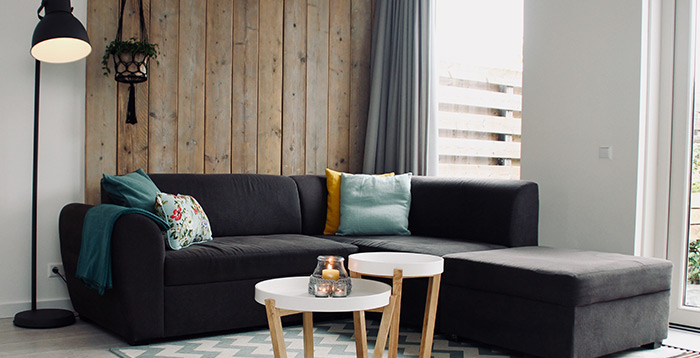1 – Smoke Alarms and Heat Alarms
Your best defence against a fire in your home is properly fitted and maintained smoke alarms and heat alarms. They should be fitted anywhere in the home where a fire could start; your kitchen, living room and home office are good places to start.
In rooms where smoke and steam are likely to occur regularly (like kitchens and bathrooms), heat alarms are the best choice – they won’t raise false alarms while cooking or showering but still give an early warning when flame temperatures are detected.
All smoke and heat alarms must be tested regularly, and smoke detectors need to be replaced every ten years due to device sensitivity changing over time.
2 – Clear Your Cooker Top
Don’t leave stuff on the stove; no leftovers, no oven gloves – take it all off. It’s all too easy to forget what’s been left on when you’ve just whipped up a meal with a couple of glasses of wine.
Some cooker tops don’t make it particularly obvious that they’re still on or pumping out heat, and a dishcloth left on a hot stove can catch fire quickly. This all seems elementary, but it’s these little things that tend to catch most people out.
3 – Inspect Your Electricals
Computers generate lots of heat, and their cooling systems draw in dust. Dust can be explosively flammable, so it shouldn’t be allowed to build up on or inside mains powered devices, like CRT screens or computer towers.
It’s always best to turn your Computers and TVs off at the mains when they’re not in use, instead of leaving them on standby. It can reduce your power bill, but it’ll also improve fire safety.
If you have a tumble dryer, clean the lint trap out after every use – no excuses – and don’t leave it on while you sleep or while you’re out. Check for blockages and accumulations of fluff and lint regularly, too.
4 – Get Some Basic Fire Extinguishing Equipment
First, get to know your fire extinguishers – because they’re not all the same. You could make things much worse if you used the wrong type of extinguisher.
Water can be used on paper, wood and other common household materials that can burn – but won’t help to defeat an electrical fire. A CO2 extinguisher works well on electrical fires but has limited applications elsewhere.
For most homes, a fire blanket by the cooker is all you’ll need, and possibly a water fire extinguisher. Water must never be used on a chip pan or cooking fat fires – a fire blanket, on the other hand, can deal with the beginnings of a chip pan fire quickly and effectively.
5 – Avoid Having Open Flames in Your Home
Candles, wood burners, open fireplaces, incense, smoking – all of these increase the risk of a house fire. It’s best to avoid burning anything in your home; smoke outside, use your central heating – and try battery operated LED candles instead of wax burning ones.
When you do use candles, incense or your fireplace, never leave the flame burning unattended. If you smoke indoors, make sure you completely extinguish the remnants when you’re finished; don’t just poke an ashtray with it – use water.
Don’t Forget…
It’s up to you to keep your home safe from fire. Try to keep it clean and clear, with easy to find escape routes. Have a plan in place if you’re trapped in your home during a fire – can you get out of your windows in an emergency? Are you able to unlock your doors quickly if you need to get out fast?
Make sure you and your family know exactly what to do if you experience a fire – keep it simple and keep it safe!
Fire Safety is Our Priority
Our expertise has led Coopers Fire to become a leader in fire safety. For more information on our educational training courses or our non-intrusive, life-saving fire and smoke protection, call us on 02392 454 405 or email info@coopersfire.com.


